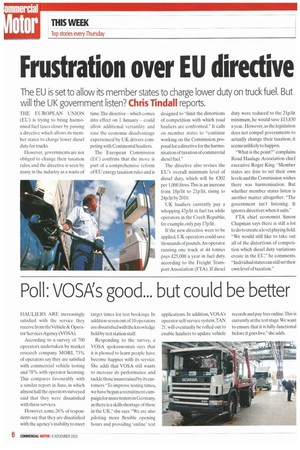Frustration over EU diredive
Page 6

If you've noticed an error in this article please click here to report it so we can fix it.
The EU is set to allow its member states to charge lower duty on truck fuel. But will the UK government listen? Chris Tindall reports.
THE EUROPEAN UNION (EU) is trying to bring harmonised fuel taxes closer by passing a directive which allows its member states to charge lower diesel duty for trucks.
However, governments are not obliged to change their taxation rules, and the directive is seen by many in the industry as a waste of time. The directive — which comes into effect on 1 January — could allow additional versatility and ease the economic disadvantage experienced by UK drivers competing with Continental hauliers.
The European Commission (LC') confirms that the move is part of a comprehensive reform of El T energy taxation rules and is designed to "limit the distortions of competition with which road hauliers are confronted." It calls on member states to "continue working on the Commission proposal for a directive for the harmonisation of taxation of commercial diesel fuel."
The directive also revises the EU's overall minimum level of diesel duty, which will be €302 per 1,000 litres. This is an increase from 18p/lit to 21p/lit, rising to 24p/lit by 2010.
UK hauliers currently pay a whopping 47p/lit in fuel tax while operators in the Czech Republic, for example. only pay 17p/lit.
If the new directive were to be applied, UK operators could save thousands of pounds.An operator running one truck at 44 tonnes pays £25.000 a year in fuel duty, according to the Freight Transport Association (FTA). If diesel duty were reduced to the 21p/lit minimum, he would save £13,830 a year. However,as the legislation does not compel governments to actually change their taxation, it seems unlikely to happen.
"What is the point?" complains Road Haulage Association chief executive Roger King. -Member states are free to set their own levels and the Commission wishes there was harmonisation. But whether member states listen is another matter altogether. "The government isn't listening. It ignores directives when it suits."
FTA chief economist Simon Chapman says there is still a lot to do to create a level playing field. "We would still like to take out all of the distortions of competition which diesel duty variations create in the EU." he comments. "Individual states can still set their own level of taxation."
































































































































































































